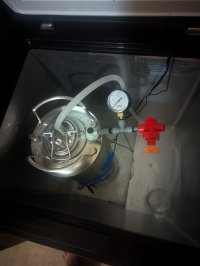The first thing, that made my beers better was probably simply gaining experience and developing a routine after the first few days of brewing. Learning by doing.
The main improvement by a major change after a while was instead of buying pre-ground malts (and store them sometimes even for weeks) buying a mill and grinding it while strike water heats up.
Attending a brew seminar for home brewers at
Kiesbye's Academy for brewers and beer someliers we learned, not to get crazy about the numbers, what home brewers often do. You're dealing with organic materials and they differ a lot (e.g. each season). And another thing I took from there was "stay pragmatic!" - like the monks back than, they didn't even have a therometer or knowledge about mirco-organisms and they made decent beers for centuries. As well as if you're enjoy home brewing you will get always a good beer!
What I took also from this seminar, while visiting the
Trumer Privatbrauerei next door, where Axel Kiesbye was brew master before: he was the one installing the open fermentation vats of his design. Beside a clever cleaning mechanism the double-walled vats for temperature control where the key feature of that.
I do not have temperature control for top fermenting beers, but now I have a socket with a control for the fridge
I started at day one with brewing all grains and three vats, because I only learned much later that extract brewing is also a thing for home brewers. I realised there is a thing called BIAB just a few moths ago, when I joined the HBT. And btw it's not a surprise, that there are very good extract beers - it wouldn't be a thing in also huge breweries all over the world (also in Germany) if it didn't turn out good.
I'm quite happy with my process and the routine at the moment - and don't know where really to start to have measurable improvements.
I read a lot about oxidation issues (fears?) here in the, but I do not feel to have an issue with that - probably because I do not have the chance to compare it. Just to try it seems a huge investment, I'm not willing to do right now.
Using bottles combined with open vat fermentation may reduce the oxidation while siphoning the beer into bottles. There's always some carbon dioxide released, and the yeast will consume the left over oxygen while carbonizing / conditioning.
I thought about buying an agitator in combination with a temperature and time controlled socket, but stirring while heating up is the thing I like on a brew day. A pump to transfer wort - seems more work cleaning than a benefit for the one transfer from the mash tank to the lauter vat.










![Craft A Brew - Safale S-04 Dry Yeast - Fermentis - English Ale Dry Yeast - For English and American Ales and Hard Apple Ciders - Ingredients for Home Brewing - Beer Making Supplies - [1 Pack]](https://m.media-amazon.com/images/I/41fVGNh6JfL._SL500_.jpg)

















































